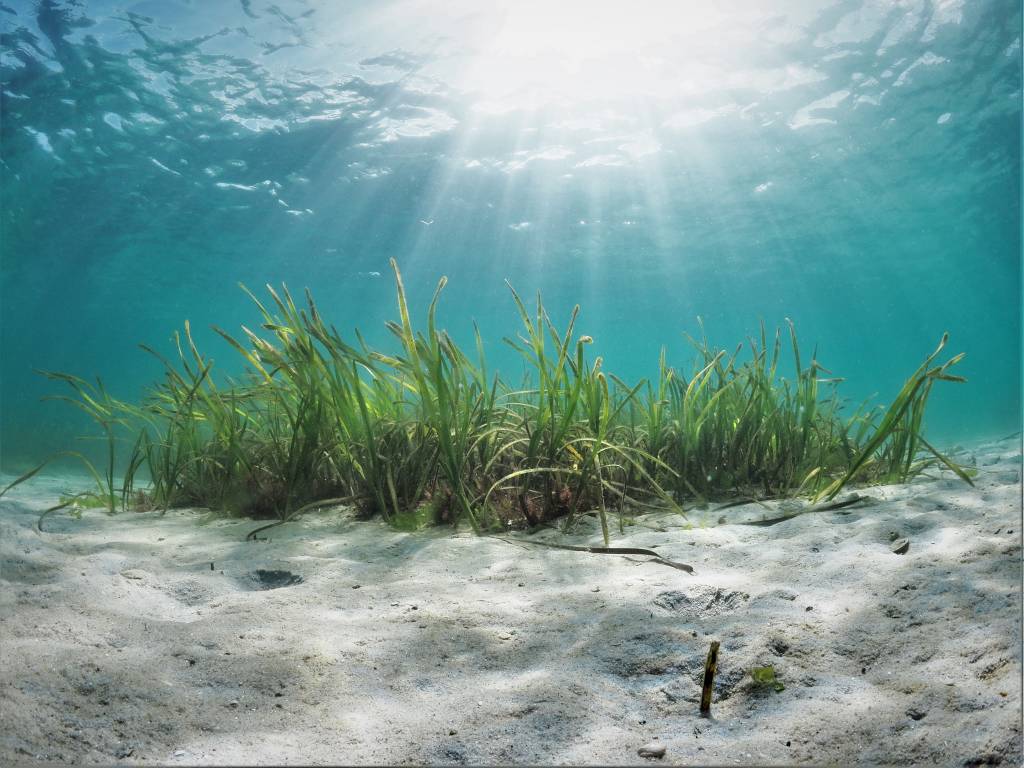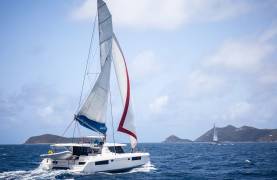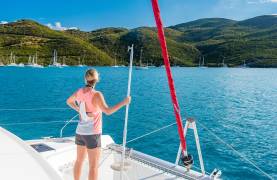
World Ocean Day is a time to appreciate all the wonders the sea offers us, from the thrill of sailing to the beauty of underwater life. It’s also a moment to consider what we can give back to the ocean to preserve its beauty and health for future enjoyment.

Here at Sunsail, we recognize that with every voyage comes a responsibility to the waters we traverse. This World Ocean Day let’s focus on concrete actions to protect our oceans.
Protecting the Ocean While We Play
Our adventures on the water come with a duty to safeguard the marine environment. Be proactive by removing any trash from the water and avoid disturbing wildlife. The creatures we observe are part of a delicate balance, and we must ensure their safety and well-being.

Supporting Ocean Conservation Efforts
We’re proud to partner with organizations across the globe that are leading the charge in ocean conservation. In destinations like Belize, our collaboration with Fragments of Hope is revitalizing degraded coral reefs through innovative restoration techniques. In Greece, we support the Ionian Dolphin Project’s research and conservation efforts to protect the region’s marine mammal populations. Acknowledging and supporting these initiatives is crucial. They’re at the forefront of safeguarding the marine ecosystems we so enjoy.

Taking climate action by supporting healthy oceans
As part of our commitment to climate and nature action, we’ve partnered with Blue Marine Foundation. We aim to help conserve the stunning coastlines and marine life that enrich your vacations and restore ocean ecosystems vital in tackling climate change. The Ocean is our biggest ally when it comes to combating climate change, for example, seagrass meadows provide coastal communities with a buffer from storms and provide shelter for a variety of marine species. These magnificent meadows can also absorb vast amounts of carbon and are known as a ‘blue carbon’ habitat. This is just one of the examples of where our Blue Marine Foundation funding is headed. Our partnership supports seven projects which span the globe, from the Mediterranean to the Caribbean, Kenya to Indonesia. Each project seeks to address the climate and biodiversity crisis in diverse ways, empowering and engaging local communities. View the latest update here.

Small Actions, Significant Impact
Efforts in less-discussed locations such as Thailand are equally as important. There, local groups are tirelessly working to restore corals and educate on marine conservation. Thailand has also established several marine protected areas to conserve its coastal and marine biodiversity, and The Thai government has implemented measures to promote sustainable fishing practices and prevent overfishing. We include clear guidance to customers when chartering, including red zones to ensure customers are not impacting marine protected areas
Making Informed Choices
Selecting reef-safe sunscreens (see our top tips for sustainable sailing here) is necessary to guarantee healthy reefs that are vital in supporting fish populations and marine habitats. Purchasing goods from local communities supports those who rely on the ocean’s bounty and contributes to the preservation of marine habitats. We also encourage bringing along a reusable water bottle and bag to minimize your waste on charter.
An Educational Journey
Our travels should not only be about leisure but also about learning and contributing to ocean preservation. Seek out experiences that offer insights into the marine environment and contribute to conservation efforts. Education is a powerful tool in the fight to protect our oceans.
We encourage observing sea life from a distance so as not to interfere with their natural behaviors. Refrain from feeding or swimming with animals, and if you see any change in the animal’s behavior, please act cautiously. When snorkeling and exploring the underwater world, be sure to enjoy corals, shells, and marine life without touching them, and do this from a distance.
Ocean warming poses a grave threat to marine ecosystems, particularly coral reefs, through a phenomenon known as coral bleaching. As sea temperatures rise due to climate change, corals expel the symbiotic algae living within their tissues, causing them to turn white and leaving them vulnerable to starvation and disease. This not only disrupts the intricate balance of life within reef ecosystems but also deprives countless marine species of their habitats and food sources, ultimately jeopardizing the biodiversity and resilience of our oceans.
In addition to the direct impacts of ocean warming, human activities such as snorkeling can also exacerbate the stress on coral reefs. It’s imperative to make use of proper cleaning equipment for your snorkel and mask to prevent cross-contamination between reefs. Even a small amount of foreign contaminants carried on snorkel gear, such as invasive species or harmful pathogens, can further weaken already fragile reef ecosystems, highlighting the critical role that responsible tourism practices play in safeguarding the health and longevity of our marine environments.

This World Ocean Day let’s commit ourselves to not just enjoying the sea but also to making informed and responsible decisions to protect it. The health of our oceans is at stake, and the time to act is now. By taking these steps, we ensure that the beauty and diversity of marine life can be sustained for the future.
Learn more about Our OCEAN Promise here.
Contributor
lizemaartens
Step Aboard Here
Start your experience with Sunsail on land and sign up to receive e-mails from us about yachts, offers and destinations.
By clicking 'Sign up' you confirm that you have read and understood our Privacy Policy and consent to our use of your information.



